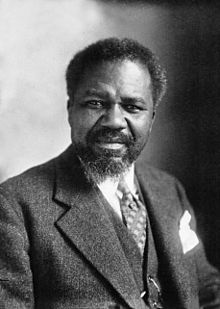Gratien Candace (December 18, 1873 in Baillif, Guadeloupe, France – April 11, 1953 in Lormaye, France) was a politician from Guadeloupe who served in the French Chamber of Deputies from 1912 to 1942 and served as vice-president of the French Chamber of Deputies from 1938 to 1940.[1][2] On 10 July 1940, Candace voted in favour of granting the cabinet presided by Marchal Philippe Pétain authority to draw up a new constitution, thereby effectively ending the French Third Republic and establishing Vichy France. He retired from French politics in 1940, declining to become part of the Vichy regime.[2] However, in 1941 he was made a member of the National Council of Vichy France.

Candace attended the First Pan-African Congress, Paris, February 19–22, 1919.[1]
African-American historian and Pan-Africanist W. E. B. Du Bois faulted Candace harshly for a perceived lack of commitment to the interests of the African diaspora, writing "Candace is virulently French. He has no conception of Negro uplift, as apart from French development."[3][4]
He earned a degree in science at the University of Toulouse and later taught as a professor and was a founder of the École nationale de la France d'Outre-Mer (ENFOM) and the Académie des Sciences Coloniales.[2]
Further reading
edit- 1996–2001 : Dominique Chathuant, « L’assimilationnisme, une structure mentale », Cyril Serva (dir), Études guadeloupéennes, Jasor, Pointe-à-Pitre, ISBN 2-912594-13-8, 2001, pp. 111–122 (version remaniée d’une communication au colloque « 50 ans de départementalisation », Université Antilles-Guyane (UAG), Fouillole, Pointe-à-Pitre, mars 1996).
- 2003 : Dominique Chathuant, « Gratien Candace: une figure de la vie politique française. 1st partie: la Troisième République (1900–1940) », Bulletin de la Société d'histoire de la Guadeloupe, number 134, janvier-avril 2003, ISSN 0583-8266, pp. 27–103
- 2004 : Béatrice De Pastre, "Cinéma éducateur et propagande coloniale à Paris au début des années 1930", Revue d'histoire moderne et contemporaine 2004-4 (numbers 51–4), ISSN 0048-8003, digital ISSN pending, ISBN 2-7011-3737-3, pp. 135–151.
- 2005 : Tracey M. Ober, Candace, Gratien (1873 - 1953) : Political Figure, Pan-Africanist, Africana: The Encyclopedia of the African and African American Experience, Second Edition, Oxford University Press, ISBN 978-0-1951-7055-9, OCLC 6198285176.
- 2008 : Dominique Chathuant, « Gratien Candace: une figure de la vie politique française. 2nd partie: un vestige de la Troisième République (1940–1953)», Bulletin de la Société d'histoire de la Guadeloupe, number 148, ISSN 0583-8266, janvier 2008, pp. 3–131.
- 2009 : Dominique Chathuant, « Une élite politique noire dans la France du premier Vingtième siècle », Vingtième siècle. Revue d’histoire, number 101, janvier-mars 2009, Presses de Sciences Po, ISSN 0294-1759, ISBN 978-2-7246-3132-6, pp. 133–148.
- 2009 : Melvyn Stokes, "Kojo Touvalou Houénou: An Assessment", Transatlantica.
- 2010 : Dominique Chathuant, « Gratien Candace, candidat (1914–1945) », L. Jalabert, B. Joly, J. Weber (dir), Les élections législatives et sénatoriales outre-mer (1848–1981), Actes du colloque 2006 de l’université de Nantes, CRHIA, Les Indes savantes, ISBN 978-2-84654-208-1, 2010, pp. 103–115.
- 2010 : Dominique Chathuant, « Français de couleur contre métèques : les députés coloniaux contre le préjugé racial (1919–1939) », Outre-mers. Revue d’histoire (ex. RFHOM), Vol. 98, numbers 366–367, ISSN 1631-0438, 1st sem. 2010, pp. 239–253.
- 2011 : Dominique Chathuant, « Entre gauches et droites, entre Paris et Guadeloupe: polémiques autour du conflit italo-éthiopien (1935) », Bulletin de la Société d'histoire de la Guadeloupe, number 160, sept.-déc. 2011, pp. 40–56.
- 2021 : "Gratien Candace, 1873-1953: In the Name of the Empire", in Josep M. Fradera, José María Portillo, Teresa Segura Garcia (ed.), Unexpected Voices in Imperial Parliaments, London, Bloomsbury Academic, "Empire's Other Histories" series, 2021, 256 p..
- 2021 : Dominique Chathuant, Nous qui ne cultivons pas le préjugé de race. Histoire(s) d'un siècle de doute sur le racisme en France, Paris, Le Félin, 2021, 504 p. .
Image gallery
edit-
1913, Versailles, presidential election
-
1914, Gratien Candace at his desk at the Chamber of Deputies
-
Le Clos du Moulin, Candace's house at Lormaye
-
1921, Blaise Diagne et Gratien Candace
-
Charles Daniélou and Gratien Candace, 11 April 1925
-
1927 Autochrome of Gratien Candace with his wife Jeanne, by Auguste Léon
References
edit- ^ a b "Gratien Candace" (in French). National Assembly. Archived from the original on August 9, 2012.
- ^ a b c McCloy, Shelby Thomas (1961). "In Bigtime Politics". The Negro in France. University of Kentucky Press. pp. 260–261. hdl:2027/mdp.39015012101344. ISBN 9780813163987. LCCN 61006554. OCLC 186669268.
Aware of their need of colonial cooperation, the French continued to confer various political honors on Negro deputies in the interim between the two World Wars. This was evidenced in the election of Gratien Candace in 1938 to be Vice President of the Chamber. The courtesy was not ignored; in 1940 he retired from French politics, declining to participate in the Vichy regime. Candace was a man of importance not alone in politics but also in culture. A graduate in science at the University of Toulouse, and afterward a professor of technology and a journalist, he became one of the founders of the Colonial Institute, now designated the Ecole Nationale de la France d'Outre-Mer, and also of the Académie des Sciences Coloniales.
- ^ Du Bois, W. E. Burghardt (April 1, 1925). "Worlds of Color". Foreign Affairs. Vol. 3, no. 3. ISSN 0015-7120.
- ^ DuBois, W. E. B. (1925). "The Negro Mind Reaches Out". In Locke, Alain LeRoy (ed.). The New Negro: An Interpretation (1927 ed.). Albert and Charles Boni. p. 385. LCCN 25025228. OCLC 639696145.
External links
edit- Media related to Gratien Candace at Wikimedia Commons
- Newspaper clippings about Gratien Candace in the 20th Century Press Archives of the ZBW